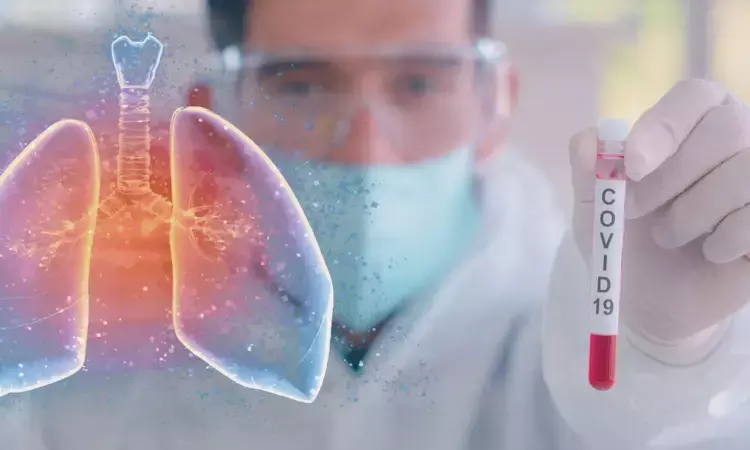- Home
- Medical news & Guidelines
- Anesthesiology
- Cardiology and CTVS
- Critical Care
- Dentistry
- Dermatology
- Diabetes and Endocrinology
- ENT
- Gastroenterology
- Medicine
- Nephrology
- Neurology
- Obstretics-Gynaecology
- Oncology
- Ophthalmology
- Orthopaedics
- Pediatrics-Neonatology
- Psychiatry
- Pulmonology
- Radiology
- Surgery
- Urology
- Laboratory Medicine
- Diet
- Nursing
- Paramedical
- Physiotherapy
- Health news
- Fact Check
- Bone Health Fact Check
- Brain Health Fact Check
- Cancer Related Fact Check
- Child Care Fact Check
- Dental and oral health fact check
- Diabetes and metabolic health fact check
- Diet and Nutrition Fact Check
- Eye and ENT Care Fact Check
- Fitness fact check
- Gut health fact check
- Heart health fact check
- Kidney health fact check
- Medical education fact check
- Men's health fact check
- Respiratory fact check
- Skin and hair care fact check
- Vaccine and Immunization fact check
- Women's health fact check
- AYUSH
- State News
- Andaman and Nicobar Islands
- Andhra Pradesh
- Arunachal Pradesh
- Assam
- Bihar
- Chandigarh
- Chattisgarh
- Dadra and Nagar Haveli
- Daman and Diu
- Delhi
- Goa
- Gujarat
- Haryana
- Himachal Pradesh
- Jammu & Kashmir
- Jharkhand
- Karnataka
- Kerala
- Ladakh
- Lakshadweep
- Madhya Pradesh
- Maharashtra
- Manipur
- Meghalaya
- Mizoram
- Nagaland
- Odisha
- Puducherry
- Punjab
- Rajasthan
- Sikkim
- Tamil Nadu
- Telangana
- Tripura
- Uttar Pradesh
- Uttrakhand
- West Bengal
- Medical Education
- Industry
Study Finds Long-Term Weakness and Breathlessness in COVID-19 Survivors, Especially Among Hospitalized Patients

Sweden: A Swedish study found that unvaccinated people hospitalized with COVID-19 or those with impaired lung function can experience long-term effects such as persistent weakness and breathlessness for up to three years, while even milder cases may leave lasting impacts.
The research, conducted by Dr. Christoffer Granvik and colleagues at Umeå University and published in the Journal of Infection, provides one of the most comprehensive long-term evaluations of physical capacity following COVID-19.
The prospective study enrolled 291 individuals with confirmed SARS-CoV-2 infection between April 2020 and May 2021 as part of the CoVUm study. Participants underwent assessments of lung function 3–6 months after infection and attended follow-up evaluations extending up to three years. Physical capacity was measured using the one-minute sit-to-stand test, while breathlessness was assessed via the modified Medical Research Council (mMRC) scale.
The study led to the following notable findings:
- Overall physical capacity improved during the first two years after COVID-19 infection but plateaued afterward.
- Hospitalised patients experienced slower recovery, with physical capacity largely stabilizing by six months.
- Non-hospitalised participants continued to gain physical strength for up to two years, though some residual reductions remained compared with expected norms.
- Impaired diffusing capacity, which measures how efficiently the lungs transfer oxygen to the blood, was strongly linked to poorer recovery.
- Hospitalisation and reduced diffusing capacity were independent predictors of decreased physical capacity (beta –6.4; beta –8.9) and persistent breathlessness (beta 3.9; beta 1.6).
By the three-year follow-up, 191 participants completed the physical capacity test, and 179 underwent breathlessness assessments. The findings underline that hospitalised individuals remain at higher risk of long-term functional limitations, while non-hospitalised individuals, though generally improving, may also experience lingering deficits. The presence of impaired diffusing capacity highlights the potential value of early identification and intervention strategies to mitigate long-term complications.
The authors caution that the study has limitations, including the absence of pre-infection baseline data, which makes it difficult to measure true changes in physical performance. Additionally, the plateau in recovery could partly reflect undiagnosed pre-existing conditions. The study also lacked longitudinal imaging, which could have clarified the underlying mechanisms driving prolonged physical impairment.
Overall, the study emphasizes the importance of targeted rehabilitation programs for COVID-19 survivors, regardless of hospitalization status. Physical capacity improvements are achievable but may take years, particularly for those with severe infections or lung function impairments. The research also points to the need for continued studies to identify predictive markers and develop strategies to optimize recovery, helping individuals regain their strength and reduce long-term respiratory limitations.
"The work revealed that COVID-19’s effects extend far beyond the acute infection phase, affecting both hospitalized and non-hospitalized patients, and highlights the critical role of ongoing monitoring and rehabilitation to support long-term health outcomes," the authors concluded.
Reference:
Granvik C, Persson IL, Barros GWF, Ahlm C, Forsell MNE, Tevell S, Sundh J, Blomberg A, Lind A, Cajander S, Normark J. Long-term Physical Capacity Following COVID-19: A Prospective, Three-Year Study. J Infect. 2025 Sep 12:106614. doi: 10.1016/j.jinf.2025.106614. Epub ahead of print. PMID: 40946864.
Dr Kamal Kant Kohli-MBBS, DTCD- a chest specialist with more than 30 years of practice and a flair for writing clinical articles, Dr Kamal Kant Kohli joined Medical Dialogues as a Chief Editor of Medical News. Besides writing articles, as an editor, he proofreads and verifies all the medical content published on Medical Dialogues including those coming from journals, studies,medical conferences,guidelines etc. Email: drkohli@medicaldialogues.in. Contact no. 011-43720751
Next Story


